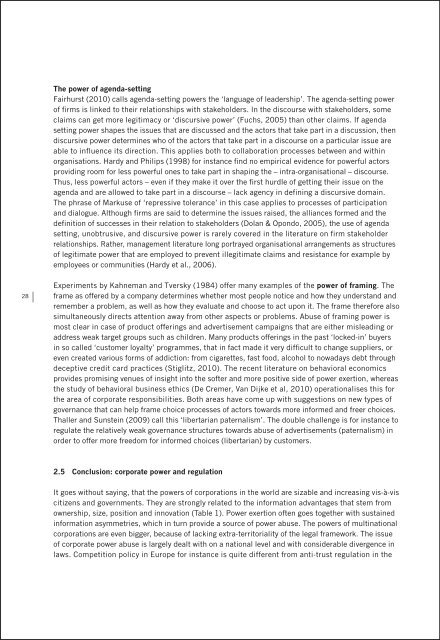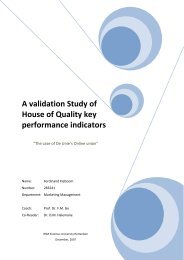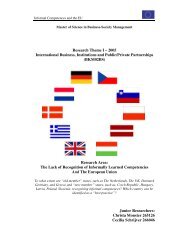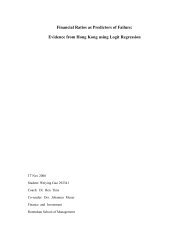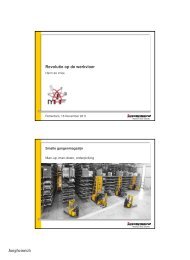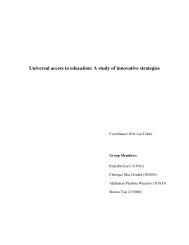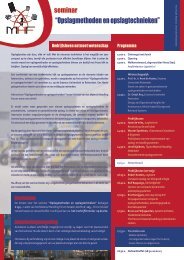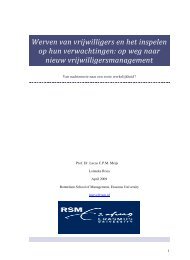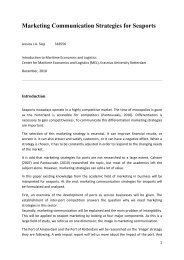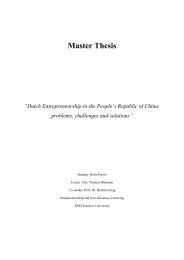Download With great power comes great responsibility (pdf) - ERIM
Download With great power comes great responsibility (pdf) - ERIM
Download With great power comes great responsibility (pdf) - ERIM
Create successful ePaper yourself
Turn your PDF publications into a flip-book with our unique Google optimized e-Paper software.
28<br />
The <strong>power</strong> of agenda-setting<br />
Fairhurst (2010) calls agenda-setting <strong>power</strong>s the ‘language of leadership’. The agenda-setting <strong>power</strong><br />
of firms is linked to their relationships with stakeholders. In the discourse with stakeholders, some<br />
claims can get more legitimacy or ‘discursive <strong>power</strong>’ (Fuchs, 2005) than other claims. If agenda<br />
setting <strong>power</strong> shapes the issues that are discussed and the actors that take part in a discussion, then<br />
discursive <strong>power</strong> determines who of the actors that take part in a discourse on a particular issue are<br />
able to influence its direction. This applies both to collaboration processes between and within<br />
organisations. Hardy and Philips (1998) for instance find no empirical evidence for <strong>power</strong>ful actors<br />
providing room for less <strong>power</strong>ful ones to take part in shaping the – intra-organisational – discourse.<br />
Thus, less <strong>power</strong>ful actors – even if they make it over the first hurdle of getting their issue on the<br />
agenda and are allowed to take part in a discourse – lack agency in defining a discursive domain.<br />
The phrase of Markuse of ‘repressive tolerance’ in this case applies to processes of participation<br />
and dialogue. Although firms are said to determine the issues raised, the alliances formed and the<br />
definition of successes in their relation to stakeholders (Dolan & Opondo, 2005), the use of agenda<br />
setting, unobtrusive, and discursive <strong>power</strong> is rarely covered in the literature on firm stakeholder<br />
relationships. Rather, management literature long portrayed organisational arrangements as structures<br />
of legitimate <strong>power</strong> that are employed to prevent illegitimate claims and resistance for example by<br />
employees or communities (Hardy et al., 2006).<br />
Experiments by Kahneman and Tversky (1984) offer many examples of the <strong>power</strong> of framing. The<br />
frame as offered by a company determines whether most people notice and how they understand and<br />
remember a problem, as well as how they evaluate and choose to act upon it. The frame therefore also<br />
simultaneously directs attention away from other aspects or problems. Abuse of framing <strong>power</strong> is<br />
most clear in case of product offerings and advertisement campaigns that are either misleading or<br />
address weak target groups such as children. Many products offerings in the past ‘locked-in’ buyers<br />
in so called ‘customer loyalty’ programmes, that in fact made it very difficult to change suppliers, or<br />
even created various forms of addiction: from cigarettes, fast food, alcohol to nowadays debt through<br />
deceptive credit card practices (Stiglitz, 2010). The recent literature on behavioral economics<br />
provides promising venues of insight into the softer and more positive side of <strong>power</strong> exertion, whereas<br />
the study of behavioral business ethics (De Cremer, Van Dijke et al, 2010) operationalises this for<br />
the area of corporate responsibilities. Both areas have come up with suggestions on new types of<br />
governance that can help frame choice processes of actors towards more informed and freer choices.<br />
Thaller and Sunstein (2009) call this ‘libertarian paternalism’. The double challenge is for instance to<br />
regulate the relatively weak governance structures towards abuse of advertisements (paternalism) in<br />
order to offer more freedom for informed choices (libertarian) by customers.<br />
2.5 Conclusion: corporate <strong>power</strong> and regulation<br />
It goes without saying, that the <strong>power</strong>s of corporations in the world are sizable and increasing vis-à-vis<br />
citizens and governments. They are strongly related to the information advantages that stem from<br />
ownership, size, position and innovation (Table 1). Power exertion often goes together with sustained<br />
information asymmetries, which in turn provide a source of <strong>power</strong> abuse. The <strong>power</strong>s of multinational<br />
corporations are even bigger, because of lacking extra-territoriality of the legal framework. The issue<br />
of corporate <strong>power</strong> abuse is largely dealt with on a national level and with considerable divergence in<br />
laws. Competition policy in Europe for instance is quite different from anti-trust regulation in the<br />
United States or even non-existent in China. As regards governance, accountability or transparency<br />
different regimes exist. Due diligence procedures – in which prior to signing a contract, actors are<br />
ensured to abide to a certain standard of care – are often vaguely elaborated which leads to consider -<br />
able problems in particular with M&A procedures. Trademarks hardly ever surpass borders, which<br />
gives room to substantial information asymmetries around the world. Financial and non-financial<br />
reporting is poorly coordinated, with some exceptions such as the Global Reporting Initiative (GRI)<br />
guidelines. Most regulatory regimes on corporate <strong>power</strong> still diverge, not in the least because govern -<br />
ments see the competitive position of their national industries enhanced by a particular approach to<br />
the fiduciary duties of firms (see Braithwait and Drahos, 2001; Van Tulder with Van der Zwart, 2006).<br />
In most of the core areas of corporate <strong>power</strong> hardly any international coordination exists, primarily<br />
guidelines that invite for voluntary support on more ‘soft sides’ of corporate control.<br />
Table 1 Dimensions of Corporate Power and regulation<br />
Power<br />
dimensions<br />
How to ‘abuse’ it… Topic of national regulation Nature of international<br />
regulation<br />
1. Ownership Breach of fiduciary duty, breach of<br />
trust, pollution of land; abuse of<br />
de-jure standards, counterfeit;<br />
standardisation; Insider trading<br />
Hierarchy: sexual harassment,<br />
pyramid games (repackaging),<br />
whistleblowers; expropriate local<br />
communities<br />
2. Size and<br />
multinationality<br />
3. Position:<br />
horizontal and<br />
vertical<br />
4. Framing:<br />
innovation and<br />
information<br />
Lower costs, moral hazard: ‘too big<br />
to fail’; entry barriers for newcomers;<br />
abuse of de-facto standards<br />
Collusion, cartel, bonus, monopoly<br />
profits, squeeze of suppliers and<br />
customers, entry / exit, crowding<br />
out, union bashing, private labeling;<br />
corruption, bribery, lower safety<br />
and security measures, lobbying<br />
Offer limited choices to consumers;<br />
pushing away <strong>responsibility</strong>; label<br />
in <strong>power</strong> battle, customer loyalty<br />
programmes; window-dressing; use<br />
information asymmetry; technological<br />
solutions for non-existing problems;<br />
limited due diligence<br />
Governance laws differ per<br />
country for the extent to which<br />
individual board member can<br />
be held accountable; some -<br />
times strong laws on abuse<br />
of information in stock market<br />
Modest regulation on risk<br />
profiles; no regulation on defacto<br />
standards;<br />
Anti-trust and competition<br />
policy for horizontal <strong>power</strong>; not<br />
for vertical <strong>power</strong>; Food safety<br />
laws; national laws on lobbying<br />
(transparency in contributions)<br />
IPR laws (de-jure protection);<br />
privacy laws; due diligence is<br />
not well regulated; modest<br />
laws on advertisements,<br />
weak regimes on certification<br />
As a result a variety of gaps exist on a global level all involving corporations:<br />
• An accountability gap: who holds who accountable for what?<br />
• A governance gap: who regulates, where and when?<br />
• An expectational gap: what can be expected from whom?<br />
Some guidelines on<br />
accountability; personal<br />
accountability of CEOs; no<br />
international coordination;<br />
ILO and UN<br />
conventions, only partly<br />
ratified; no co-ordination;<br />
divergent accounting<br />
standards (IFRS)<br />
Modest international<br />
co-ordination tried<br />
(e.g. Basel-III )<br />
No co-ordination,<br />
some convergence, but<br />
important exemptions<br />
(e.g. in EU regulation);<br />
voluntary standards –<br />
such as ISO – prevail<br />
Only guidelines, no inter -<br />
national certification body;<br />
TRIPS agreement with<br />
important exemptions<br />
29


